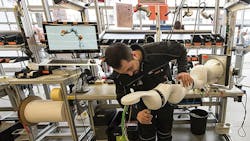The German government is becoming more involved in efforts to thwart a Chinese bid for robot maker Kuka AG before Chancellor Angela Merkel’s trip to China next week.
Conflict is building up ahead of Merkel’s arrival in Beijing on Sunday for her ninth visit as chancellor, along with about 20 German company executives. This time may differ from the celebrations of trade ties in previous years as the relationship turns more competitive and Merkel faces growing domestic pressure to protect Kuka, which she views as a model company combining digital technology and Germany’s industrial strengths.
Government officials in Berlin have met Kuka COE Till Reuter to discuss alternative offers after last month’s 4.6 billion-euro (US$5.2 billion) bid by Foshan, China-based Midea Group Co., according to a person familiar with the chancellery’s views on the case. Merkel and Siemens AG CEO Joe Kaeser have discussed Kuka in recent days, according to a second person.
“China and Germany are like-minded countries, both focusing very much on manufacturing,” Hans Kundnani, a fellow at the German Marshall Fund in Berlin, said in an interview. “They’ve increasingly become competitors in similar, high-end production areas,”
The gambit by Midea, China’s biggest maker of home appliances, for Kuka, a supplier of industrial robots, is exposing angst in Berlin about the longer-term intentions of state-backed Chinese investors. While Germany wants to avoid a trade war with China, the episode is a wakeup call that adds weight to Merkel’s demands for China to level the playing field for foreign investors or risk investment restrictions in Europe, according to the person familiar with the matter, who asked not to be identified discussing private talks.
Merkel Visits
Kuka, based in the Bavarian city of Augsburg, supplies automation equipment to companies such as Airbus Group SE, Volkswagen AG and Fiat Chrysler Automobiles NV. Underscoring the company’s importance, Merkel visited its headquarters last year and toured its robot display at Germany’s Hanover industrial show with President Barack Obama in April.
Linked by $164 billion in commerce, China is Germany’s fourth-biggest trading partner and Germany is China’s fifth-biggest. Merkel’s June 12-14 schedule in Beijing and Shenyang includes a joint cabinet meeting and talks with Chinese President Xi Jinping and Prime Minister Li Keqiang.
As Chinese economic growth flags at home, its companies are more aggressively expanding overseas with government encouragement and an eye toward long-term investment strategies. Midea last week said its offer for the robot maker was in the “best interests” of its employees and shareholders.
The chancellor will address German concern about Chinese investment practices, though it’s not certain she’ll specifically raise the Kuka bid, a German official told reporters in Berlin on Friday. Her main demand will be reciprocity between Germany and China in terms of investment and rules for companies, the official said.
Not Protectionism
Efforts to find alternate investors for Kuka are led by German Vice Chancellor Sigmar Gabriel, who heads the Social Democrats, Merkel’s junior coalition partner. He warned this week that Europe needs rules to fend off “unfair competition” from countries with state-run economies such as China. For now, Germany doesn’t plan to amend its foreign-investment law to block stake purchases, he said.
“This is not protectionism against the market,” Gabriel, who’s also economy minister, said Wednesday. “This is more about open markets against state-sponsored interventions. We need to talk about that in Europe.”
In Kuka’s case, the German government is said to be exploring other ways to stop a Chinese takeover, including courting potential buyers such as ABB Ltd. and Siemens.
“What I think we can’t do is sacrifice German companies, German jobs, on the altar of open markets if they don’t have a level playing field, don’t have the same rules,” Gabriel said Wednesday. “Open markets require the same rules of the game.”
German business leaders are less concerned. The Federation of German Industries, representing about 100,000 companies with 8 million workers, said fears of job and technology losses are often unfounded.
“Based on our experience, the Chinese aren’t interested in breaking up companies” they invest in, said Friedolin Strack, head of the BDI’s international markets department. “For distribution in China, entirely new channels open up when a large Chinese company supports its German subsidiary in marketing in China.”
By Arne Delfs and Patrick Donahue, with assistance from Brian Parkin
About the Author
Bloomberg
Licensed content from Bloomberg, copyright 2016.
